
بسم الله الرحمن الرحيم
IIFWP Summit of World Leaders on
The World at a Turning Point: Considering Innovative Approaches to Peace through
Responsible Leadership and Good Governance
August 11-16, 2003
Seoul, Korea
An Interreligious Council at the United Nations
Statement by:
Imam Al Sadig Al Mahdi
Introduction:
When the present World Order was established after the Second World War, Secularism reigned supreme. The two prevailing schools of thought were the Capitalist Democratic system of the West, and the opposing Communist challenger. What they both had in common was the belief that cultural and Religious identities, which characterized pre- modern societies, will be overtaken by the forces of Modernity. Little wonder therefore, that the charters and institutions of the New World Order marginalized cultural and Religious matters. In the last twenty years of the Twentieth Century, Secularist World views had to abandon their self-righteousness in favor of a revival of ascriptive cultural and Religious World views. This paper will trace this phenomenon, outline its inevitable impact on World affairs, review the changes, which the UN system has to address, and argue for an intellectual and institutional adjustment in the International system to accommodate it.
The following seven points present my argument:
- The most important relevant developments for the purpose of this thesis are:
- Towards the second half of the seventies of the Twentieth century, a rise in Religious fundamentalism was observed. In the mid-eighties, the American Academy of Arts and sciences commissioned a study of the phenomenon. In 1988, after four years of research it published its report. It documented a rise of Religious fundamentalism in several World Religions, namely, Buddhism, Hinduism, Judaism, Christianity and Islam. They sought to repel the challenges of secularism, and to cater for spiritual and moral needs.
- “The Challenge to the South” was a title of a Report of the South Commission, which was published in December 1990. It studied the failures of the Development Programs in many countries of the South and concluded that one common cause of that failure was their neglect of the cultural characteristics of the societies concerned.
- An independent World Commission on Culture and Development (WCCD) was established jointly by UNESCO and the UN in December 1992. The Commission had been mandated by the two organizations to prepare a policy-oriented report on the interactions between culture and development. In 1995 the commission published a Report under the title of “Our Creative Diversity”. The report emphasized the importance of culture for Human endeavor, and recommended the recognition of Cultural Rights as an important pillar of Human Rights.
In many fields of Human activity social, political, economic, diplomatic and Non-Governmental activities, Religious and Cultural aspects gained greater prominence.
- In his critique of Pure Reason, Emanuel Kant had argued correctly for the fact that verifiable Human Knowledge depends upon Perception, however, in his Critique of Practical Reason, he recognized correctly, the fact that spiritual, ethical and aesthetic values, which are out of reach of perception, are essential for Human Survival.
In fact, a comprehensive survey of Human needs should reveal that there are ten basic needs: Spiritual, material, ethical, emotional, etymological, social, aesthetic, athletic, ecological and entertainment.
Some of these needs will be satisfied by political, economic, scientific and technological means. Others will be satisfied by Religion, Love and Culture. Some expressions of Religious fundamentalism do a disservice to Humanity by trespassing upon the fields of science and Technology. Similarly, some expressions of Secularist fundamentalism have trespassed upon the field of the supra-rational. Both produce a pop-eyed Image of Man. At this juncture of Human Development, Religious Enlightenment should conclude that it is necessary to:
First: That there is a natural Universe, which is fathomable through Human Perception. That Human Nature partakes in a supra-rational Existence, which may be approached through Revelation, Intuition, Insight and Extrasensory Perception. The two pillars are, have always been, and will continue to define Humanity.
Second: A comprehensive study of comparative Religion, would reveal the essential universality of spiritual and ethical values, and could enable believers to spell out a common approach to the resolution of the problems of Humanity.
- Religious belief is a psychological anchor for the human self, it is a means of self accountability, it is a foundation for altruistic morality, it is cement for social cohesion, it repels the anguish of loneliness, and realizes togetherness. Consequently, Religion constitutes a very powerful psychological and social force. Apart from the Spiritual and Moral Force of Providence, which non-believers may question, the psychological and social force of Religion may enhance the cause of Goodness, or in the hands of wrong leaders, may be abused.
Although we may all pray that God wills the ultimate prevalence of Good over Evil and a happy end to the saga of Humanity, God’s will manifests itself through Human Endeavor.
- The following set of problems challenge Humanity, and require an intensive, coordinated effort by believers to help face them successfully, they are:
- In most instances Humanity had failed to resolve its inevitable conflicts peacefully. There should be a binding commitment to the non-violent resolution of conflicts. The culture of Peace requires a mutual recognition of the other in terms of rights, and cultural distinctions, a recognized mechanism for the resolution of social, National and International conflicts, a means of nipping conflicts in the bud, and numerous programs to enhance International cooperation in all the relevant aspects of Human activity.
- Development seeks to develop the material and social infrastructure of societies, to enhance the Production of goods and services to satisfy basic human needs. It constitutes a basic challenge to individual countries, and to the International Community.
- Social Justice to undo the polarization of Society into haves and have-nots. It seeks to make the social structure of society like a plateau not a Pyramid.
- The freedom of intellectual, scientific and technological research.
- The protection of basic freedoms of conscience, of expression, and of association.
- Good Governance, which requires four basic foundations, namely, participation, accountability, transparency and the Rule of Law.
- Preservation of the Natural Environment on the basis of a binding program for ecological discipline.
- Recognition of the Religious other, the Cultural other, and commitment to cooperation among Religions and cultures.
Many current problems are being tackled by secular stratagems. Many Religious expressions are so backward that far from helping in the resolution of current problems, they are part of the problem because they gear themselves to the past and fail to address social change. However, so much enlightened Religious opinion recognizes the need to address social change. It realizes the possibility of maintaining its authentic beliefs, and catering for the needs of a changing World. Modern Man is spiritually and emotionally hungry. The deep involvement with drugs and alcohol, and the ecstatic character of modern Music are not simply for entertainment, they seek somehow to satisfy that spiritual and emotional hunger. The current revival of Religion is good news for Humanity because it constitutes a better satisfaction of that hunger. However, this phenomenon may be bad news if it does so at the cost of enslaving Man to the Past. It is incumbent upon religious opinion to disarm the reactionaries, save the soul of Modern Man, and be a strong driving force in his endeavor to achieve a better social and International World Order.
- The United Nations System today is not what it was during its formative years. The next phase was strongly colored by the impact of the Cold War. After the Cold War it entered a third phase. Politically, it has -to some extent- been marginalized by the considerable power of the USA Mega Power. There is great need to review the regulations of the Security Council to achieve more balance and more Democracy. Between them, the initiatives of the Mega Power of the USA, and the phenomenon of Globalization, which further empowers the Multinationals, would leave the UN with even less power to tackle world problems.
Not withstanding such dangers, it is necessary to observe how the specialized agencies of the UN have developed their activities in different ways to address emerging World problems. Landmark conferences are the conferences on the population, Women, Development, Children, the Environment and water resources. The intellectual and institutional reforms recommended by these vital conferences have contributed to the evolution of the UN system. It is necessary at this juncture to set up an International workshop to discuss UN reform.
- There are four main areas, which require an enhanced UN interest and the evolution of appropriate institutions.
- Development: In the light of Globalization, and the power of multinationals, it is necessary to recognize development as an International concern. This should include how to check the negative aspects of Globalization, how to establish a code of business ethics for the Multinationals, how to deal with the problem of the External debt, and so on. It is not simple altruism; the developed World has a self-interest in the development of the underdeveloped World. It provides them with greater investment opportunities, and wider markets. They need to deal with the poverty of have-not Nations in the same way they dealt with the have-not classes in their own countries. Otherwise, the poor countries’ problems will simply overcome them and spill over to the developed World. Terrorism, illegal immigration, drug cultivation, population irresponsibility, health hazards, are all outcomes of poverty and despair. It is true that the World Bank and the IMF have recently been more broadminded in their approaches. There needs to be a collective international commitment to development along lines recommended by the U.NDP conferences, and the Recommendations of the South Commission.
- Democracy: It is now well established that dictatorship means bad governance. It is the precondition for abuse of Human Rights. Good governance must be recognized as a basis for international recognition. The U.N should set up a Good Governance watch and make it a condition for UN membership. Good Governance is based upon four pillars participation, accountability, transparency and the Rule of Law.
- Non Governmental Organizations: The development of NGOs is a means of wider participation, and meaningful engagement of civil society. A mechanism to allow NGOs to make themselves heard in the UN system is necessary.
- Religion: This has been intellectually and institutionally overlooked by the current U.N System. In the light of the new developments this failure should be rectified.
- The establishment of an interreligions Council at the U.N would respond to current needs and bridge a gab in the present U.N System. That council will have, at least, four functions:
First: it could make a bibliography of Religions, and put together an international library of Religion.
Second: It would through various activities raise consciousness and knowledge of the faiths of mankind. A step in that direction should be the establishment of an institution of Inter-religious understanding with regional branches.
Third: It would act as a Congress of faiths conducting fruitful exchanges between the different faiths and so promoting greater tolerance and understanding.
Fourth: Recommend ways and means by which Religion could bring its considerable weight to the resolution of contemporary national and international problems of mankind.
The formation of this council should be based upon a U.N Resolution. The outcome should be a universal Religions Charter, and an interreligions Council with specific regulations specifying credential and institutional powers.
Towards that end, the present conference should issue the necessary recommendations.

